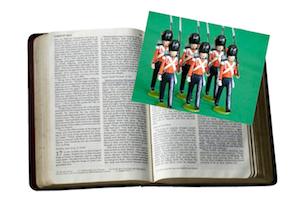 One other New Testament point against pacifism needs to be examined. What about the positive references to soldiers? Why would Paul compare Christian life to soldiering if being a soldier was inherently sinful? Why encourage Timothy to endure hardship as a “good soldier of Christ Jesus” if being a soldier were unthinkable?
One other New Testament point against pacifism needs to be examined. What about the positive references to soldiers? Why would Paul compare Christian life to soldiering if being a soldier was inherently sinful? Why encourage Timothy to endure hardship as a “good soldier of Christ Jesus” if being a soldier were unthinkable?
It could be pointed out that the New Testament does use bad people to teach lessons: the unjust steward in Luke 16, the corrupt judge in Luke 18, the idea of Jesus coming as a “thief in the night.” But that doesn’t seem to be the case here. Christians aren’t told to imitate any of those men, yet Timothy is told to be like a soldier.
I think we have proof yet again that military life was not repugnant to the early church. This seems to fit with the Book of Acts, where Paul and others seemingly showed courtesy and respect to military men. (Though it should be pointed out that respect was shown to all men; Jesus and His followers only showed anger and condemnation toward those who pretended to be religious but had ungodly hearts)
This is a far cry, however, from Christians choosing to become soldiers. As I pointed out in the comments on Tuesday, pagan worship was an integral part of Roman public life. There was no separation of church and state. Ritual sacrifices were a regular occurrence in military life. It would have been extremely difficult for a Christian to be part of the army without being pressured to be a part of those pagan activities. Rome’s triumphs were victories for Rome’s gods; could Christians contribute to that?
My understanding of 2 Timothy 2:4 prevents me from considering a military life, even as it refers to soldiers. (!) How can I, as an ambassador of the Kingdom of Heaven, pledge my loyalty to an earthly kingdom? How can I get involved in “civilian affairs” while I’m serving as a soldier of Christ? I don’t see how I can serve two masters, being a soldier of Christ and a soldier of a human nation.
Could what we see in the New Testament possibly be the path for us: respect for those who serve, yet separation for ourselves? That’s the path I feel called to at present. I’ll present more of the whys next week.
[The artwork is of Sabbas Stratelates, 3rd century Christian who became a general in the Roman army, then was martyred upon refusing to renounce his faith. Taken from Wikimedia Commons]


